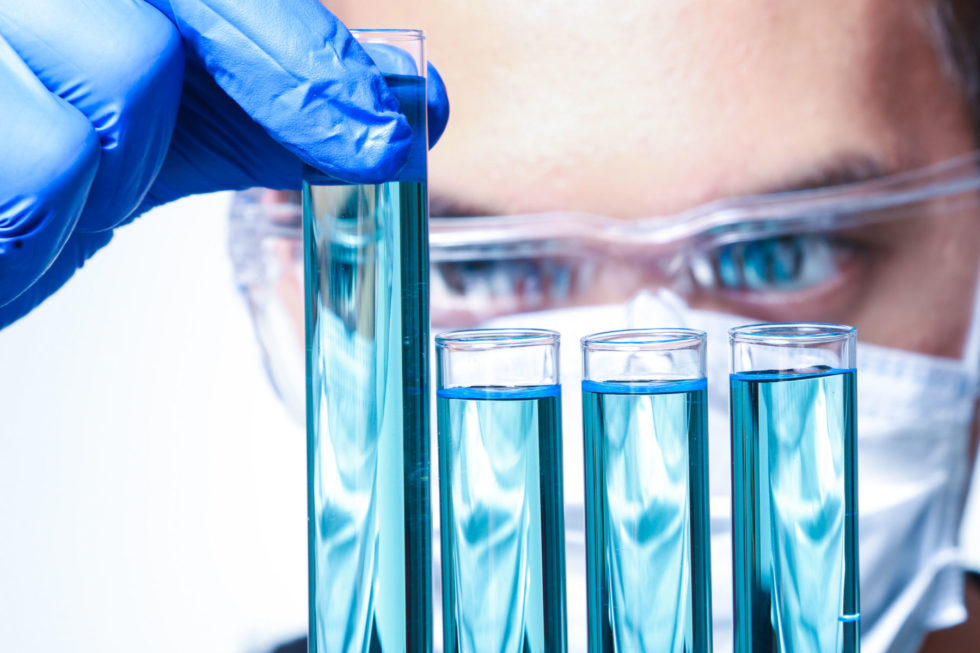Biologicals represent a novel and promising therapy for people with chronic inflammatory diseases such as rheumatism, Crohn’s disease, diabetes and psoriasis.
However, they do not lead to the desired success in all patients. In some cases, they are accompanied by severe, undesirable side effects.
In the following, we will answer all relevant questions about biologicals, such as:
- What are biologicals?
- How do biologicals work?
- Which biologicals are available?
- When is therapy with biologicals possible?
- Which side effects occur during treatment with biologicals?
- What are biosimilars?
And you will find out how therapy with biologicals works for moderate to severe psoriasis.
What are biologicals?
Biologicals are novel drugs that are used in the treatment of inflammatory autoimmune diseases.
Biologicals (bDMARDs: “biological disease-modifying antirheumatic drugs”) are produced in living cells using genetic engineering. The biotechnologically produced protein substances resemble our body’s own antibodies and act against inflammation-promoting messengers.
Doctors use biologicals in the treatment of rheumatoid arthritis, psoriasis, cancer or metabolic diseases.
How do biologicals work?
Conventional basic drugs often attack the entire immune system of the patient. Biologicals, on the other hand, act specifically by either
- directly intervening in inflammatory processes or
- inhibiting inflammatory messengers
- and/or blocking certain receptors and immune cells.
A significant improvement in the symptoms of the disease is often seen after 2-4 weeks.
Patients do not take biologicals orally in the form of tablets, as stomach acid would immediately destroy the active ingredients. For this reason, doctors administer biologicals as an infusion or inject the medication directly under the skin.
Treatment with biologicals
In contrast to conventional drugs, biologicals act much more specifically and in some cases much faster as therapeutic antibodies. This important advantage has its price.
Biologicals are very expensive due to the complex production process. In addition, in some cases, they have clear disadvantages. For example, many people are more susceptible to infections, allergic reactions and/or intolerances during therapy with biologicals.
Before treatment with a biological, your doctor must clearly rule out various diseases such as tuberculosis. Due to the high costs of treatment, doctors do not prescribe biologicals to all patients. Only when conventional basic drugs do not achieve the desired therapeutic goal, do doctors turn to biologicals.
Which biologicals are available?
The goal of biologicals is to eliminate the messenger substances within the immune system that are responsible for certain inflammatory processes in our body.
The active ingredients of the individual drugs act in different ways.
In the following we have compiled a list of approved biologicals (in Germany):
TNF-alpha blockers
TNF-alpha blockers inhibit the tumor necrosis factor (TNF)-alpha and thus prevent an inflammatory reaction. Among the frequently used active ingredients are
- Adalimumab,
- Etanercept,
- Infliximab,
- Certolizumab and
- Golimumab.
Diseases in which TNF-alpha blockers act as drugs:
- Crohn’s disease,
- Ulcerative colitis,
- Rheumatoid arthritis and
- Psoriatic arthritis.
Interleukin(IL)-1 blocker
Interleukin(IL)-1 blockers inhibit the inflammatory signal substance interleukin-1.
The approved interleukin-1 blockers include:
- Anakinra and
- Canakinumab.
Interleukin(IL)-6 Blocker
Interleukin(IL)-6 blockers inhibit the messenger substance Interleukin 6, which has a strong inflammatory effect.
- Tocilizumab
for example, is a commonly used drug that acts as an interleukin-6 blocker.
Interleukin(IL)-12 blocker
The messenger substance interleukin(IL)-12 influences the course of intracellular infections.
Common interleukin(IL)-12 blockers include
- Ustekinumab.
Diseases in which interleukin(IL)-12 blockers act as drugs are
- Psoriasis,
- Psoriatic arthritis and
- Crohn’s disease.
Interleukin(IL)-23 blocker
Interleukin-23 stimulates the formation of T-cells that are directed against the body in numerous autoimmune diseases. Interleukin(IL)-23 blockers inhibit this process.
- Ustekinumab
for example, is a commonly used interleukin-23 blocker.
Diseases in which interleukin-23 blockers are used, for example:
- Psoriasis,
- Psoriatic arthritis and
- Crohn’s disease.
Targeted T-cell therapy
- Abatacept
for example, is considered a drug in targeted T-cell therapy, used to slow down the development of inflammation.
Targeted B-cell therapy
- Rituximab and
- Belimumab
are two drugs that specifically target B lymphocytes. These often favor the reactions of the immune system in autoimmune diseases.
Biologicals or methotrexate (MTX)?
If therapy with basic conventional drugs such as methotrexate (MTX) is not successful, biologicals are often used. On average, doctors recommend taking conventional drugs for a period of at least 3-6 months.
If certain factors are present during the course of the disease, a doctor can prescribe a combination of conventional drugs such as methotrexate and biologicals at an earlier stage.
Factors that call for the use of biologicals include:
- High inflammatory activity,
- Insufficient response to basic medicines and/or
- Rapidly progressive disease progression.
The decision depends on the individual course and extent of the disease. Biologicals are suitable both for monotherapy and in combination with methotrexate.
What side effects do biologicals have?
Biologicals are highly effective drugs. Possible side effects must not be ignored. Depending on the individual course and severity of the disease, the doctor must weigh up the pros and cons and monitor the course of therapy strictly and regularly.
The possible side effects of biologicals differ according to the active ingredient and the disease in question. Individual clarification can only be provided by a specialist.
TNF-alpha-blockers, for example, carry a greatly increased risk of infection because the active ingredients partially suppress the patient’s own immune system.
Interleukin-6 blockers often cause inflammatory reactions in the joints, fatigue, anemia, osteoporosis or cardiovascular diseases.
Doctors often administer biologicals in the form of an injection, which can cause redness and swelling at the injection site.
Before therapy with biologicals, it is important to identify and/or exclude both known and previously unrecognized diseases of the patient. These include diseases such as tuberculosis, hepatitis B and inflammatory bowel diseases.
Doctors often recommend a pneumococcal or flu vaccination before treatment with biologicals. Your doctor will also explain to you to what extent interactions with other drugs or treatments may occur.
What are biosimilars?
Biosimilars are drugs that usually have the same effect as biologicals. However, they differ from the original in their structure and are therefore not identical, but only similar to biologicals.
In practice, this means that a patient may tolerate biosimilars equally well or even better than a biological. In other cases, patients don’t tolerate biosimilars at all.
Experts say that biosimilars are about 20 – 30% cheaper than the original biologicals.
Biologicals for psoriasis
For patients with moderate to severe psoriasis, purely external treatment is often not sufficient. This includes medication to be applied to the skin or light therapy.
The systemic therapy prescribed in this case takes the form of tablets or injections. Active ingredients such as methotrexate or fumaric acid thus enter the bloodstream and act throughout the body.
In some cases, however, systemic therapy with conventional drugs is not suitable or does not provide sufficient relief of symptoms. Your doctor may then consider treatment with biologicals.
Biologicals inhibit the messengers and enzymes that cause psoriasis during treatment.
The following active ingredients are used to treat psoriasis (especially plaque psoriasis, psoriasis vulgaris and psoriatic arthritis):
- Adalimumab,
- Infliximab,
- Etanercept and
- Ustekinumab.
Many people affected by psoriasis report very good results after treatment with biologicals. The treatment had a positive effect on the symptoms of psoriasis.
However, a complete cure for psoriasis is not possible with biologicals.
Rheumatism, diabetes, psoriasis – a treatment with biologicals
Biologicals act in a targeted manner and intervene directly in the development of many diseases. By means of complex biotechnological processes, proteins are produced which are very similar to our own antibodies.
For several years now, physicians have been successfully using biologicals in the treatment of chronic inflammatory diseases such as rheumatism, Crohn’s disease, diabetes and psoriasis. For many of those affected, their lives have changed for the better thanks to treatment with biologicals.
However, we must not forget that the use of biologicals can also cause numerous side effects. In particular, the greatly increased risk of infection must be discussed and weighed up with a specialist before treatment with biologicals.
The active ingredients of individual biologicals differ as much as the areas of application and side effects. Strict monitoring of the treatment by a doctor is therefore mandatory.
Biologicals also have a strong track record in treating the symptoms of moderate to severe psoriasis. However, a complete cure is not possible even with this drug.
We are curious about your experiences with biologicals! Tell us your story and share your experiences with others in our Facebook group.
Find all sources
Sources:
Mrowietz U., Schmid-Ott G.: „Schuppenflechte: Was Sie schon immer über Psoriasis wissen wollten.“ S. Karger 2012.
„Psoriasis: Weniger Nebenwirkungen mit Biologika.“ In: Ärzte Zeitung online, 09.05.2014. URL: http://www.aerztezeitung.de/medizin/krankheiten/haut-krankheiten/article/859971/psoriasis-weniger-nebenwirkungen-biologika.html. (accessed on 16.06.2019)
Krüger K. et al.: „S1-Leitlinie der DGRh zur sequenziellen medikamentösen Therapie der rheumatoiden Arthritis.“ Adaptierte EULAR-Empfehlungen und aktualisierter Therapiealgorithmus. Z Rheumatol 2012. URL: https://dgrh.de/dam/jcr:f887ba34-f7fc-4a6f-bf55-dde42aacb25c/leitlinie_s1__medikamentoese_therapie_ra.pdf. (accessed on 16.06.2019)
Institut für Qualität und Wirtschaftlichkeit im Gesundheitswesen (IQWiG): „Biotechnologisch hergestellte Arzneimittel in der Zweitlinientherapie bei der rheumatoiden Arthritis: Abschlussbericht.“ 2013. URL: https://www.iqwig.de/download/A10-01_Abschlussbericht_Biologika-Zweitlinientherapie-bei-rheumatoider-Arthritis.pdf. (accessed on 16.06.2019)
Meng Y., Dongmei L., Yanbin P., Jinju F., Meile T., Binzhu L. et al. 2014: „Systematic review and meta-analysis of ustekinumab for moderate to severe psoriasis.“ In Clin Exp Dermatol 2014; 39(6): 696-707. URL: https://www.ncbi.nlm.nih.gov/pubmed/25039593 (accessed on 16.06.2019)
Lockwood S.J., Prens L.M., Kimball A.B. 2017: „Unerwünschte Wirkungen von Biologika bei Psoriasis.“ Karger Kompass Dermatol 2017;5:195-199. URL: https://www.karger.com/Article/FullText/481335 (accessed on 16.06.2019)
Arnold A.W., Itin, P. 2007: „Biologika bei Psoriasis vulgaris.“ In: pharma-kritik, 28/No. 15. URL: https://www.infomed.ch/pk_template.php?pkid=39 (accessed on 16.06.2019)
Smolen JS. et al., 2016: „EULAR recommendations for the management of rheumatoid arthritis with synthetic and biological disease-modifying antirheumatic drugs.“ In: Ann Rheum Dis 2017;76:960-977. URL: https://www.ncbi.nlm.nih.gov/pubmed/28264816. (accessed on 16.06.2019)

Bernd is one of the founders of Simply Psoriasis. He has been suffering from psoriasis for more than 20 years, but sees the chronic skin disease with more composure than a few years ago (which was a hard work). Nevertheless, he is very keen to make psoriasis easier and more socially accepted.









Last Comments